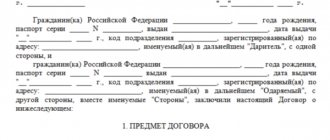An exchange agreement is an agreement under which the parties exchange property that belongs to them by right of ownership.
- Form and sample
- Free download
- Online viewing
- Expert tested
FILES
The subjects of an exchange agreement can be legal entities and individuals, as well as the state and municipalities. In other words, the parties to this agreement may be any legally capable persons.
An exchange agreement can be concluded either orally or in writing. An important nuance is that an oral conclusion is possible only if the subject of the contract in its value does not exceed the minimum wage by ten times. Contracts, the cost of the subject of which exceeds ten times the minimum wage, are drawn up in writing.
Below, using the example of a car exchange agreement, we will look at how such a document is drawn up and what nuances you should pay attention to when drawing it up.
Barter agreement
Kurgan
May 24, 2023
We are: Denisov Denis Denisovich, born on March 11, 1999, living at the address Kurgan region, Kurgan city, Peter the Great street, building 88, apartment 324, passport XXXXX XXXXXXX, issued by the Federal Migration Service of Russia for the Kurgan region in the city of Kurgan on March 11, 2019, hereinafter referred to as Seller 1, on the one hand, Ilyin Ilya Ilyich, born on March 12, 1999, living at the address Kurgan region, Kurgan city, Cheryomushki street, building 874, apartment 398, passport XXXX XXXXXXX, issued by the Federal Migration Service of Russia for the Kurgan region in the city of Kurgan on 03/12/2019 , hereinafter referred to as Seller 2, on the other hand, have entered into this agreement as follows:
The preamble to the agreement traditionally states:
- type of transaction;
- place and date of conclusion of the agreement;
- names and roles of parties to the contract;
- residential address and passport details of individuals.
An exchange agreement, like other transactions, has essential conditions, without which it cannot enter into legal force. In our case, such conditions include:
- subject of the contract;
- the actual value of the property that is the subject.
Does a legal entity have the right to enter into free civil contracts?
Any civil law contract is considered to be for compensation by default, unless it expressly states otherwise (Clause 3 of Article 423 of the Civil Code of the Russian Federation). Under a gratuitous contract, one party, having provided something to the other (goods, services), does not receive any reciprocal provision. If the contract provides for at least the most insignificant consideration, in value terms not comparable with the cost of the goods and services received, then such a contract is considered compensated.
The conclusion of gratuitous agreements between legal entities is generally not prohibited by law, but in practice it may be difficult or even impossible.
Thus, the subject of an agreement between legal entities should not be the donation of things worth more than 3,000 rubles (subclause 4, clause 1, article 575 of the Civil Code of the Russian Federation).
Two commercial firms, one of which is the founder of the other, cannot enter into an agreement on the gratuitous transfer of property for use (clause 2 of Article 690 of the Civil Code of the Russian Federation).
It is problematic to enter into a gratuitous agreement for a transaction that essentially involves the receipt of benefits by any of the parties - for example, when concluding an agreement for agency services.
In turn, if we talk about common types of gratuitous contracts, these include:
- the above-mentioned agreements on donation, transfer of property for use (unless their conclusion is prohibited);
- storage agreement;
- representation agreement;
- loan agreement.
ConsultantPlus experts explained when legal entities can enter into a free transaction (agreement). Get trial access to the K+ system and upgrade to the Ready Solution for free.
Item
Information about the subject of the contract is the basis of any agreement. In the case of an exchange agreement, the object itself is the property itself, which is exchanged by the Counterparties. At the same time, it is important to indicate comprehensive characteristics of this property so that no disagreements arise later. In an exchange agreement where the subject is the parties' cars, the following characteristics are indicated: - make of the car; — year of manufacture of the vehicle; — VIN number; - engine capacity; — color of the vehicle; - registration number; — vehicle passport; - registration certificate. So, information about the subject of the agreement in the text of the document is written as follows: The parties, in accordance with this agreement, transfer to each other the following vehicles that belong to them by right of ownership:
Denisov Denis Denisovich transfers in favor of Ilyin Ilya Ilyich a passenger car of the daewoo nexia brand, manufactured in 2011, VIN number - ХХХХХ-ХХХХХХ, engine number - 00000000, engine capacity - 1.4 l., body number - 0000000, color - white, registration number - Х ХХХ ХХ ХХ, vehicle passport – ХХХХХХ, issued (by whom) ХХ ХХ ХХХХ (date of issue). Ilyin Ilyin, in turn, transfers in favor of Denisov Denis Denisovich a passenger car of the Datsun on-Do brand, manufactured in 2011, VIN number - ХХХХХ-ХХХХХХ, engine number - 00000000, engine capacity - 1.4 l., body number - 0000000, color - silver, registration number - X ХХХ ХХ ХХ, vehicle passport - ХХХХХХ, issued (by whom) ХХ ХХ ХХХХ (date of issue). At the time of exchange, the actual cost of each car, as approved by both parties, is set at 450,000 (Four hundred fifty thousand) rubles 00 kopecks. The parties are the owners of these vehicles based on the provision of technical passports. Cars do not belong to third parties by right of ownership, are not pledged or seized.
Don't have time to read the article?
Get an initial consultation from several companies for free
: fill out an application and the system will select suitable companies!
Start selection in a few clicks >
Important! It happens that the parties exchange unequal goods. Then the contract must provide for the requirement that the counterparty who transfers the goods at a lower cost pays the difference in price. Otherwise, the exchange agreement will be contested.
The barter agreement is consensual in its essence. This means that it can be concluded both at the time of transfer of goods to each other, and only with the intention of exchanging property in the future.
Rights and obligations of the parties
This section specifies the obligations of the parties under this agreement. However, drawing up a section is not a prerequisite. But we still recommend drawing it up in order to avoid controversial situations in case of misunderstanding between the parties. So, below we give approximate wording within this paragraph:
The parties have the right to: • Demand the transfer of ownership of the vehicles specified in the clauses on the subject of the agreement. The parties undertake to: • Transfer to each other the vehicles specified in the text of the document in technically sound condition. • Report all shortcomings, hidden defects and breakdowns, if any. • Transfer ownership of the vehicles stated in the subject section to each other within 3 (three) days from the date of signing the agreement. • Fulfill your obligations in strict accordance with this agreement.
What to remember
- A barter agreement is concluded when two people agree to give each other their property and receive someone else’s. They don't want to transfer money back and forth, so they just change.
- An exchange represents two purchase and sale transactions for each object, but in one contract. And the rules for the document apply the same as for the sale and purchase.
- If one person behaves contrary to the agreement, the other can cancel the exchange and demand compensation.
- The agreement can be drawn up in simple written form. But if you are not confident in your abilities, it is better not to skimp on the services of a lawyer or notary in order to take into account various nuances.
- You will not be able to escape taxes when exchanging. The same rules apply as when selling property.
Responsibility of the parties
Also an important factor is the preparation of a section on the responsibility of Counterparties. This is primarily due to risk reduction. Below we present the main provisions that may be written in the text of the document:
The parties bear financial liability in the event of non-fulfillment or improper fulfillment of obligations under this agreement. Counterparties are responsible for deficiencies in the alienated objects if they are identified after signing the agreement. If these shortcomings were discussed before signing the agreement, the parties do not bear responsibility.
Dispute resolution procedure This section often contains the following language:
In case of any disputes, the parties resolve them through negotiations. If during the negotiations the parties do not reach a compromise, disputes are resolved in court.
Free provision of property preservation services
In the general case, an agreement for the storage of a thing transferred from one person to another implies remuneration (clause 1 of Article 896 of the Civil Code of the Russian Federation). However, the parties have the right to include provisions in such an agreement under which the party that accepted the item for storage will not receive payment for services rendered (clause 5 of Article 896 of the Civil Code of the Russian Federation).
In addition, the very possibility of free storage is provided for in clause 2 of Art. 897 Civil Code of the Russian Federation. It also says that the depositor must reimburse the custodian for the costs associated with ensuring the safety of the thing, but again unless otherwise provided by the agreement.
In practice, a gratuitous contract for the provision of property preservation services concluded between legal entities may be part of a legal relationship in which the depositor, in turn, provides any services related to his type of activity to the custodian free of charge. For example, related to representation.
What are the general characteristics of a gratuitous contract?
We can talk about such signs as:
1. Absence (in some cases) in the contract of provisions providing for strict liability of the parties for failure to fulfill their obligations.
Actually, such provisions may not be included in the contract if the parties do not consider them significant (clause 1 of Article 432 of the Civil Code of the Russian Federation).
Or, on the contrary, it must be included if the provisions of the contract need to show that the party performing the duties free of charge does so in order to obtain benefits. And if the other party violates its obligations, the first will apply strict sanctions against it - as a tool to compensate for the costs incurred. Such costs may be expressed, for example, in transportation costs for the transportation of gratuitously transferred property, which the other party suddenly refused to accept.
2. Superficial regulation of securing obligations (use of collateral, prepayment, financial guarantees).
But in some cases such regulation cannot be avoided, for example, if a gratuitous loan agreement is drawn up.
It is noteworthy that a gratuitous civil law contract can be drawn up outside the jurisdiction of the Civil Code of the Russian Federation. Let's study this nuance in more detail.
Minuses
The exchange option takes much longer to search for than the purchase and sale option. This is especially true for non-resident exchanges: the probability that a resident of the locality you need needs to move to your city is in some cases close to zero.
to agree on the amount of additional payment for participants.
In some cases, it is influenced by non-market factors, for example, the need for an urgent move.
It is difficult to establish an adequate market value of the exchanged apartments: published advertisements for the sale of similar housing express only the desires of sellers and buyers. The prices of real transactions remain behind the scenes.
Exchange, compared to buying and selling, narrows the choice . The parties have to move not to the optimal area of the city from their point of view, but to the one where the exchange is offered.
If a participant purchases housing for the first time, the purchase allows her to make a tax deduction of the personal income tax base in the amount of the transaction amount. In the option under consideration, she will receive such a deduction only from the amount of the additional payment.
An exchange agreement gives both participants additional rights compared to the sale and purchase. Within three years after its conclusion, any of the parties can change their mind and make claims against the counterparty, seeking not only its cancellation, but also reimbursement of their expenses.
After weighing all the pros and cons, make a decision.
Results
Gratuitous and compensated agreements can be concluded by Russian legal entities both provided that such agreements are within the jurisdiction of the Civil Code of the Russian Federation, and when concluding agreements not named in the code. If the agreement is nevertheless named in the Civil Code of the Russian Federation, then it can be gratuitous for legal entities provided that there are no restrictions on this - those provided for by law (as in the case of a gift agreement), dictated by the content of legal relations on the merits (as in the case of a commission agreement). The conclusion of an agreement outside the jurisdiction of the Civil Code of the Russian Federation does not exclude the application of the provisions of the code to it on the principle of legal analogy.
You can learn more about the application of civil law in corporate legal relations in the articles:
- “Essential terms of the purchase and sale agreement under the Civil Code of the Russian Federation”;
- “Violation of the terms of the contract for the supply of goods.”
You can find more complete information on the topic in ConsultantPlus. Free trial access to the system for 2 days.
pros
Reducing the risk of fraud on both sides. Under such an agreement, the participants immediately receive what they want with a guarantee; whereas in case of counter purchase and sale, the terms of registration of transactions do not coincide, which is successfully used by swindlers.
There are a number of fraudulent schemes, as a result of which a person is left without an apartment and without money. This happens especially often when citizens, in order to save money, ignore the services of realtors and try to make transactions on their own.
When a person sells an apartment to another person and intends to buy from a third person, this is also associated with risk . Money is subject to inflation, and in recent decades we have encountered cases where it was sudden and rapid.
In the nineties, in 2008, 2014, we had situations where, shortly after the sale, it was impossible to buy housing of the required quality with the proceeds from a previously sold apartment.
On the other hand, apartments during a crisis are difficult to sell for an acceptable amount, since buyers do not have enough cash for this.
When moving, a person is faced with the problem of adequately assessing the purchased housing : he does not know enough about the features of life in another city. If you rely on prices published in newspapers, you may get a different situation on the spot.
Creditors with the help of bailiffs and debt collectors can claim the money received from a purchase and sale transaction: tracking such a transaction is not difficult, while the only home a person cannot legally take away .
Finally, there is a category of citizens for whom it is simply impossible to resist spending cash when it is already in their hands. An exchange agreement with an additional payment allows you to “settle” the listed problems.
Tax benefit . If a party sells housing purchased less than three years ago, he is obliged to include income from the sale in the year-end declaration and pay income tax on the declared amount.
In an exchange transaction, tax is paid only on the additional payment, which, by agreement of the participants, can not be indicated in the document or written down in the text in a symbolic amount, but the real amount can be transferred from hand to hand.
Such an agreement is an ideal solution to housing problems between relatives . With age, the parental family has shrunk to two people; she no longer needs a large apartment, for which she also has to pay ever-increasing utility costs. Children got married, grandchildren appeared, but for now young families live in a modest two-room apartment or studio.
The difficulties of relocation and temporary residence are eliminated. For citizens with a family or valuable property, the sale of apartments threatens the prospect of temporary rental housing while they search for a suitable purchase option. If the search drags on, this will lead to a long-term deterioration in the standard of living. The barter agreement eliminates this problem.
Alternatives
In some cases, it is possible not to terminate the contract, but to make changes to it in accordance with a court decision. The change occurs in favor of the party that is interested in implementing this change. A change can be made if there are certain circumstances that arose after the signing of the documents, and their occurrence was not intended by the parties and was not previously foreseen by them. But the easiest way is not to resort to lengthy legal proceedings, but to try to reach a mutually beneficial agreement. If it comes to litigation, then it is worth seeking the help of a qualified lawyer who will help resolve the conflict with maximum benefit for both parties.
Features of termination
Either party may either refuse the exchange agreement or go to court to terminate it if there are sufficient grounds for this. If both parties agree to termination, then termination can be carried out mutually without initiating any legal proceedings. The exchange agreement is declared invalid - and the parties, if desired, enter into a new one.
If only one party is dissatisfied with the concluded agreement, if only one party wants to terminate the agreement, then it is necessary, if the other party is fundamentally against a mutually equivalent resolution of the conflict, to go to court.
It is important to remember that if one party returns to itself the property that it transferred as a result of the agreement, then it, accordingly, loses the property that it received under this agreement, since the agreement terminates evenly for both parties.
Free representation agreement (with an attorney)
A representation agreement involves the delegation of powers from one legal entity to another in order to perform certain legal actions on behalf of the first (and at the expense of the first) (clause 1 of Article 971 of the Civil Code of the Russian Federation).
By default, such an agreement is supposed to be drawn up on a reimbursable basis, unless its provisions (or the law) provide otherwise (clause 1 of Article 972 of the Civil Code of the Russian Federation). But if the provisions of the law require the principal to pay remuneration to the attorney in certain cases, then the parties will not be able to enter into a gratuitous agreement (clause 4 of article 421, clause 1 of article 422 of the Civil Code of the Russian Federation).
If the condition on remuneration or non-provision of remuneration is not reflected in the contract in principle (and is not regulated by law), then the work of the attorney in any case must be paid at the market price of similar work (clause 2 of article 972, clause 3 of article 424 Civil Code of the Russian Federation).









